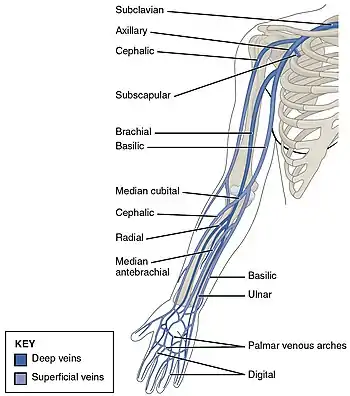Ulnar veins
The ulnar veins are venae comitantes of the ulnar artery. They drain the superficial venous palmar arch.[1] They arise in the hand and terminate by uniting with the radial veins to form the brachial veins. They mostly drain the medial aspect of the forearm. They receive the venae comitantes of the anterior and posterior interosseous arteries near the elbow, as well as a large branch from the median cubital vein. The ulnar veins are larger than the radial veins.[1]
| Ulnar veins | |
|---|---|
 Veins of the upper limb | |
| Details | |
| Source | Superficial palmar venous arch |
| Drains to | Brachial vein |
| Artery | Ulnar artery |
| Identifiers | |
| Latin | Vena ulnaris (plural: Venae ulnares) |
| TA98 | A12.3.08.030 |
| TA2 | 4985 |
| FMA | 70897 |
| Anatomical terminology | |
They follow the same course as the ulnar artery.
Additional Images
 The deep veins of the upper extremity.
The deep veins of the upper extremity. Ulnar veins
Ulnar veins Ulnar vein
Ulnar vein
References
- Standring, Susan (2020). Gray's Anatomy: The Anatomical Basis of Clinical Practice (42th ed.). New York. p. 951. ISBN 978-0-7020-7707-4. OCLC 1201341621.
{{cite book}}: CS1 maint: location missing publisher (link)
This article is issued from Wikipedia. The text is licensed under Creative Commons - Attribution - Sharealike. Additional terms may apply for the media files.